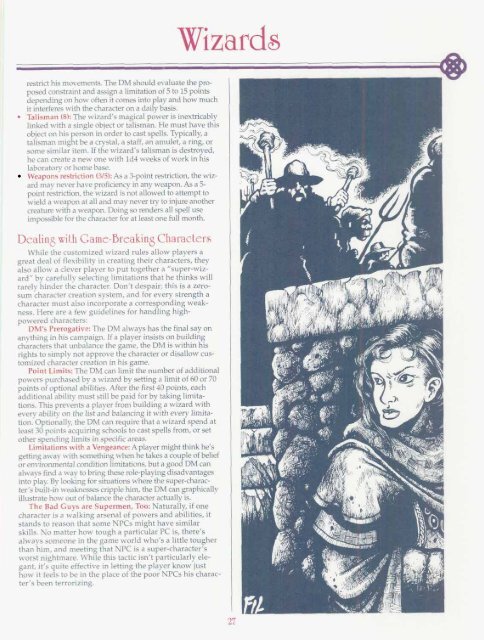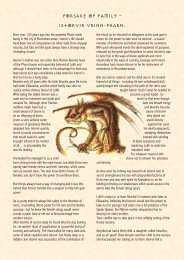Spells & Magic - Orbis Terrarum RPG
Spells & Magic - Orbis Terrarum RPG
Spells & Magic - Orbis Terrarum RPG
You also want an ePaper? Increase the reach of your titles
YUMPU automatically turns print PDFs into web optimized ePapers that Google loves.
estrict his movements. The DM should evaluate the pro-<br />
posed constraint and assign a limitation of 5 to 15 points<br />
dending on how often it comes into ulav and how much<br />
linked with a single object or ti&&. He must have th&<br />
object on his person in order to cast spells. Typically, a<br />
talisman might be a crystal, a staff, an amulet, a ring, or<br />
some similar item. If the wizards talisman is destroyed,<br />
he can create a new one with ld4 weeks of work in his<br />
laboratory or home base.<br />
Weapons restriction (3/5): As a ?-point restriction, the wiz-<br />
ard may never have proficiency in any weapon. As a 5-<br />
point mtridon, the wizard is not allowed to attempt to<br />
wield a weapon at all and may never try to injure another<br />
crraturr with a weapon. Doing so mders all spell use<br />
impossible for the character for at least one full month.<br />
great deal of flexibility in creating their characters, they<br />
also allow a clever player to put together a ”super-wizard<br />
by carefully selecting limitations that he thinks will<br />
rarely hinder the character. Don’t despair; this is a zerosum<br />
character creation system, and for every strength a<br />
character must also incorporate a corresponding weakness.<br />
Here are a few guidelines for handling highpowered<br />
characters:<br />
DM’s Prerogative: The DM always has the final say on<br />
anything in his campaign. If a player insists on building<br />
characters that unbalance the game, the DM is within his<br />
rights to simply not approve the character or disallow customized<br />
character creation in his game.<br />
Point Limits: The DM can limit the number of additional<br />
powers purchased by a wizard by setting a limit of 60 or 70<br />
points of optional abilities. After the first 40 points, each<br />
additional ability must still be paid for by taking limita-<br />
tions. This prevents a player from building a wizard with<br />
every ability on the list and balancing it with every limita-<br />
tion. Optionally, the DM can require that a wizard spend at<br />
least 30 points acquiring schools to cast spells from, or set<br />
other spending limits in specific areas.<br />
Limitations with a Vengeance: Aplayer might think he’s<br />
g&g away with something when he takes a couple of belief<br />
or envhnmental condition limitations, but a good DM can<br />
always find a way to bring these roleplaying disadvantage<br />
into play. By looking for situations where the super-charac- ‘<br />
ter’s built-in wea!aesses nipple him, the DM can graphicdy<br />
illustrate how out of balance the character actually is.<br />
The Bad Guys are Supermen, Too: Naturally, if one<br />
character is a walking arsenal of powers and abilities, it<br />
stands to reason that some NPCs might have similar<br />
skills. No matter how tough a particular PC is, there’s<br />
always someone in the game world who’s a little tougher<br />
than him, and meeting that NPC is a super-character’s<br />
worst nightmare. While this tactic isn’t particularly ele-<br />
gant, it’s quite effective in letting the player know just<br />
how it feels to be in the place of the poor NPCs his charac-<br />
Wizards<br />
rs<br />
,A<br />
i@



